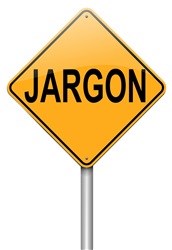It's everywhere - in business, in government in organisations... Jargon (along with its equally unwelcome cousin, gobbledygook).

© creative soul via Fotolia.com
What's scary is that 26% of executives admit to using expressions they don't understand in meetings. And another research report showed that the thing people dislike most in their jobs is jargon.
The worst organisations for jargon:
• Law
• Financial services
• IT
• Science and medicine
• Government
Organisations spend a lot of money on websites and emails with information that many people simply can't understand.
It's estimated that poor communications account for as much as 40% of the total costs of managing all business transactions.
The hidden costs of gobbledygook
Gobbledygook wastes time and money. Difficult documents and emails take longer to read and understand.
People don't have time and energy to wade through jargon and gobbledygook. It irritates and angers them. But beyond that it costs money - by people not complying with laws or rules because they can't understand them, and in time wasted explaining overly complicated documents to customers or employees who can't decipher them.
Poor writing and communication cost millions each year in wasted time and lost business opportunities in South Africa and around the world:
• In America, an estimated 30% of all business writing is produced to clarify or seek clarification of something already written.
• A study by the Royal Mail in the UK estimated that British businesses lose up to £5 billion a year because of pretentious, inappropriate or error-ridden writing.
Huge savings
Companies regularly produce documents that are hard to read or even indecipherable, but good communication can lead to big savings:
• The US Navy saved $350m when they moved to Plain Language just in their memos.
• Merely by redrafting manuals into Plain Language, General Electric saved $275,000 in one year.
• Plain Language has saved the British government an estimated £500m in the last 20 years.
All organisations should drop jargon and gobbledygook and follow Winston Churchill's example, "Use simple words everyone knows, then everyone will understand."
Simple words help you express your message clearly. Too many complex words slow your reader down. By replacing complex words with simple words, it helps your reader concentrate on what you are saying.
More advantages of Plain Language
Clear, simple writing is easy to understand. It inspires confidence in both the reader and writer. It's evidence of clear thinking.
It reaches people with low literacy skills. Helps everyone understand your message.
Avoids misunderstandings and errors and saves time, because the message is understood first time. In short:
1. Plain language gets your message across in the shortest time possible.
2. More people will be able to understand your message.
3. There's less chance that your document will be misunderstood, so less time is spent in time-consuming explanations.
4. Plain language is socially responsible.
Put simply, Plain Language works.













































